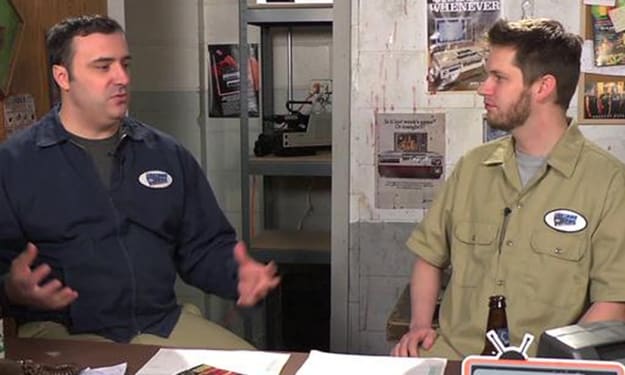I’ve Watched Over 200 Movies This Year: Here’s How They’ve Rewired My Brain
An observation on the art of filmmaking and its ever-evolving nature.

It all started when I realized how despite calling myself an avid movie watcher, I haven’t come close to sniffing the glorious number of 1,000 films to my viewing credit. I know more about movies as a concept than as an experience. Most of my knowledge comes from books and the goddamn internet. A similar realization about music last year resulted on an exploration of the many music genres I listened to. The results were a newfound appreciation on the art and its history, and it was with the success of this in mind that I decided to embark on this visual journey of what the auteurs call cinema. The goal is to watch 1,000 films by the end of the year; with 200 already on the board, I can either continue this aggressive focus or mellow down a little for what will amount to a big push come Summer. Can’t say I’ve decided what to do yet, but the clock is always ticking. I figured that in the meantime I can take a moment to reflect on the endeavor.
No matter how much you read about a certain subject, there comes a point in time where the only way to continuously expand your knowledge on any given field is practical experience with the material. The scope of what’s available in theory will never compare to the capabilities outside it. I say this as a man who enjoys theory and its constructions, but maybe a little too much. Years of reading never prepare you for what’s in front of you. You can read about theme, style, and substance all you want, it is only when you watch them flow in a visually stunning narrative that you truly come to appreciate what it all means. It’s the same reason people are attracted to colorful and wonderfully organized meals or the splendor of a newly constructed building. A craftsman understands these ideas better than the academics who see the medium as either high or low art, and that is precisely why he crafts them and the others admire.
Watching these many movies in such a short period of time has had on odd effect in the way I see the world. They ranged from all sorts of genres from practically every decade. Film has fascinated me for practically my entire life for many reasons – the process, the effort, the artistry, the façade, the vision, but none more than the metaphysical idea of capturing an unintentional moment in time, forever sealed in print for as long as the technology exists. They capture how a specific place looked at a given and almost specific moment, showing us a glimpse into a world we hear about but never really grasp. Film carries the scent of time. Whenever you watch a movie you are being transported to a different world and you finally get a chance to taste not only what it’s like to be in another place, but in a moment of the past. The effects are even more palpable in films with little to no sets, where all the scenes take place in an actual house or apartment, where an entire city can serve as a backdrop for infinite possibilities, or a small town a center of psychological exploration or claustrophobic terror. Regardless of intention, the vibe remains constant and palpable in any given movie, even when it’s terrible or lacking depth. Take The Room or Birdemic; no one would take them as nothing more than the very worst the art has to offer, yet there’s value in exploring the zeitgeist they were made in and why they came out the way they did.
Films amount to the same stories told over and over again through different perspectives. Practically every story (more specifically story beat) follows the same pattern even if the film has no conflict or plot. Something needs to happen in order to keep things moving; movies will never be about nothing, as even nothing itself becomes something if presented in it. Jacques Tati’s Playtime may have had no plot other than the character’s experience within the confines of what’s presented, but in doing so shows us a vivid world resembling a fever-dream journey of a crazy night out. The reason it worked was the marvelous way it arranged those experiences into a coherent beat.
The grasp of time and space is what gives the film medium a psychological and emotional edge over any other art form. It combines the elements of what was and transforms them into a collage of visuals unlike anything humanity had seen before. Its impact on human culture, and perhaps on its very nature itself, cannot be overstated. Every movie captures an attitude or mood a good portion of people at the time (and after) were interested in observing or living. They speak of the humor, values, ideas, and interest a collective had (whether this was programmed or not). The stark contrast between American filmmaking in the 70s and 80s can fill a whole encyclopedia about how the rest of society evolved better than most historical textbooks could tell by themselves. A film like Dog Day Afternoon is perfect example. You could feel the almost textual aura of Vietnam permeating throughout the whole movie, and not once is the conflict ever explicitly mentioned. The film is a direct critique of the American culture the war had created, and it did it by just showing how unhinged, lost, and volatile it made two people feel.
A similar effect takes shape when watching foreign language films. The audio barrier never detracts the fascination I feel for the landscapes and their use of space. Every single one offers a distinct style related to the place the film is from. French films are very different from Italian films, and the same goes for Spanish and German ones. Even while you can’t understand some of the deeper cultural contexts (unless you’ve watched over 100 or more films of a given country) other than for historical events you’re aware of, you receive a remarkable insight to the way their environment looks and the many ways it is perceived by its inhabitants. You begin to suddenly understand the existential struggle each culture has in their own unique way. It’s the small little intricacies that always end up connecting this vast network of nationalities and ideals. Every single film contains a moment of relatability. A moment in Horse Feathers, a 1930s Marx Brothers classic, perfectly illustrates this point; there’s a sequence in the film showing the titular character of Groucho use the candy Lifesaver as a play-on-words for when a woman asked for the actual devise to be lured out of the water. A simple joke and observation still relatable today, even if it doesn’t make you laugh.
The collective synthesis of all these films form an idea about humanity’s compulsive need to make sense of the world. Movies (and perhaps maybe all arts) amount to a form of control. By constructing or participating in a story with characters in a current or past setting, you are effectively attempting to be a master of your ideas and surroundings. It’s like children playing God, with the obvious intent of hoping the story crafted participates in a new trend of ideas you hope the rest of society begins to grasp and understand. The whole cyclical aspect of action and reaction takes vivid form in the way a film and its audience interacts. Each new year the process is furthered changed and evolved, with every new entry producing either a negative or positive effect (very much subject to change).
So yeah, this is what watching 200 movies in a span of 60 days has led me to. I toyed with some of these ideas before but it was only through the constant jumping between genres and decades that I came to see how it all connects. You watch one film, and if you’re really interested in watching another one the mood of the other film will influence the decision you take, with each passing film further shifting and changing the genre and style. You start with a western and before you know it you’re on your way to Tim and Eric’s Billion Dollar Movie.
No other art is capable of reaching the depths of absurdity as effectively as filmmaking can. There is no frontier the medium isn’t capable of crossing. It’s the only artform that can truly capture the entirety of what it is to be human. Now more than ever it is our detached eye, the one we use to explore the past in movement, where we can attempt to visualize how it was through historical fiction, and where we can lose ourselves in the absolute emptiness that encompasses the universe while feeling a little tinge of relief in knowing there’s no other responsibility than to take care of what we have. It will never get stale, even if it’s going through some sort of crisis right now. But that’s a different topic for another day. What matters now is the almost infinite amount of available for the beholder to see.
About the Creator
Ezra I. James
Absurd essayist from the outskirts of Shambhala.
Enjoyed the story? Support the Creator.
Subscribe for free to receive all their stories in your feed. You could also pledge your support or give them a one-off tip, letting them know you appreciate their work.






Comments
There are no comments for this story
Be the first to respond and start the conversation.